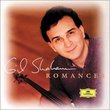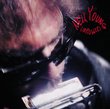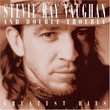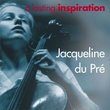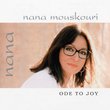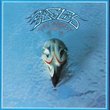| All Artists: Cesar Franck, Jacqueline Du Pre, Daniel Barenboim Title: Jacqueline du Pré - Chopin: Cello Sonata in G minor, Franck: Sonata in A / Barenboim Members Wishing: 0 Total Copies: 0 Label: EMI Classics Release Date: 5/7/1990 Genre: Classical Styles: Chamber Music, Instruments, Strings Number of Discs: 1 SwapaCD Credits: 1 UPCs: 077776318424, 077776318455 |
Search - Cesar Franck, Jacqueline Du Pre, Daniel Barenboim :: Jacqueline du Pré - Chopin: Cello Sonata in G minor, Franck: Sonata in A / Barenboim
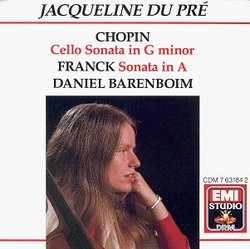 | Cesar Franck, Jacqueline Du Pre, Daniel Barenboim Jacqueline du Pré - Chopin: Cello Sonata in G minor, Franck: Sonata in A / Barenboim Genre: Classical
The late Jacqueline Du Pré may not have been the most disciplined cellist ever, but her impulsive and exciting playing makes her recordings irreplaceable treasures. These performances, including the seldom-heard Chopi... more » |
Larger Image |
CD DetailsSynopsis
Amazon.com The late Jacqueline Du Pré may not have been the most disciplined cellist ever, but her impulsive and exciting playing makes her recordings irreplaceable treasures. These performances, including the seldom-heard Chopin Sonata and the cello arrangement of Franck's violin sonata, are characteristic of Du Pré at her best, with strong assistance from Daniel Barenboim's assertive collaboration. If you want more of Du Pré's music, EMI's Les Introuvables de Jacqueline Du Pré is an even better buy--six discs containing nearly all her best recordings. Whichever you choose, this is music making that demands to be heard. --Leslie Gerber Similar CDs
Similarly Requested CDs
|
CD ReviewsDefying the Odds Chuck Levin | Conway, MA USA | 09/07/2000 (5 out of 5 stars) "That this recording was made at all is a testament to the incredible inner emotional strength and sheer musical intensity of the irreplaceable cellist, Jacquelyn Dupre who, while not yet diagnosed with multiple sclerosis, had been badly suffering its effects for some time. After six months of leaving the cello in the case during her convalescence, she suddenly pulled it out during a momentary period of strength and alacrity and made the recording. The recording thus serves as a testament to the power of the human spirit and Dupre's indomitable will. As well, the playing is superb. Dupre exhibited her characteristic intensity, superb line, and tone quality in a way that brought the pieces, particularly the Franck almost eerily to life. Barenboim, her husband, weeved a seemless accompaniment, proving himself even then a superb pianist. The music, too, is noteworthy. The Chopin sonata was one of the composer's rare forays into string music. WHile not an unqualified success, the piece still has much to recommend it. The Franck sonata, written for cello and transcribed for violin, is an utter masterpiece, particularly when in the hands of someone like Dupre who had the uncanny ability to manipulate human emotions with her instrument unlike almost any other. The sound quality of the recording is not quite up to modern standards -- it was recorded in the late 60's -- but this does not, in my opinion, detract from the greatness of the recording." Chopin and Franck, her last studio recordings P. Rah | Sion, Switzerland | 08/03/2000 (4 out of 5 stars) "This release is the last studio recording Jacqueline du Pre made before she was diagnosed with multiple sclerosis. It is a very moving recording, with the sound quality marring the 5-star quality from this otherwise superb set. She used her 1970 Peresson cello, so one is able to hear the difference from her other recordings, where she used either the Davydoff Strad, or the Goffriller. But the characteristic 'du Pre Sound' is very much evident - the fullness of each note, passionate phrasings, etc. Both works here receive very individual interpretation from du Pre and Barenboim, who plays the fiendishly difficult piano parts of both works with great aplomb. The Franck, especially receives a very passionate reading, which has become one of my favourite versions of this work. The unusally dry Abbey Road recording is the only factor which mars the set, but as always, du Pre's passionate approach makes the listener deeply invloved with the music. A highly enjoyable set." Moving testament to a great artist klavierspiel | TX, USA | 06/05/2002 (5 out of 5 stars) "This, according to the notes by the producer, was Jacqueline Du Pre's very last studio recording. Although she had not yet been diagnosed with the multiple sclerosis that was to halt her career and eventually kill her, it was obvious by this time, early in the 1970s, that something was very wrong. After not playing for months, she had one last remission and was able to make this recording of two great Romantic sonatas with her husband, Daniel Barenboim.
It would be tempting, knowing the moving circumstances of their creation, to listen to these performances with indulgence. In fact, no allowances are necessary--as her producer asserts, there is not the least sign in her playing of illness or lessening powers. The full tone and impulsive, passionate musicianship for which she was famed are there in abundance. A few notes go wild here and there--she was working against time and this has the feel of a one-take, live recording if it was not actually such--but can easily be forgiven. What hindsight does impart is an almost unbearable poignance to the poised, perfectly judged traversal of the Largo of the Chopin Sonata, where composer and both performers (Barenboim, of course, is more than an able partner) are at their expressive peaks. The sound by today's standards is not state-of-the-art, but perfectly adequate. For anyone who enjoys great music making in general, and du Pre in particular, this is a recording not to be missed." |

 Track Listings (8) - Disc #1
Track Listings (8) - Disc #1





